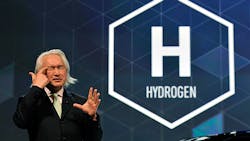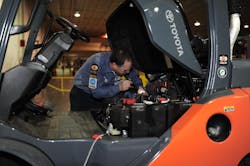How Toyota's Hydrogen Fuel Cells Will Reduce Supply Chain Emissions
Toyota Motor Corp. and partners will begin a project to use hydrogen produced from renewable energy to power forklifts to test the feasibility of a low-carbon hydrogen supply chain.
Electricity generated at a wind-power plant in Yokohama City near Tokyo will be used to separate hydrogen and oxygen from water, the partners including Toshiba Corp. and Iwatani Corp. said in a statement Monday.
The hydrogen will be transported in a hydrogen fueling truck to a factory, a vegetable and fruit market, and two warehouses to be used for fuel cell-powered forklifts, according to the statement.
Hydrogen fuel cells may reduce supply chain emissions by 80%.
Photo courtesy @ToyotaForklift
“This low-carbon hydrogen supply chain is expected to reduce CO2 emissions by at least 80 percent compared with a supply chain using forklifts powered by gasoline or grid electricity,” the partners said in the statement.
Japan plans to build a “ hydrogen-based society” to encourage the use of fuel cells to power cars, homes and office buildings.
Trial operations will begin this fall with two forklifts, to be increased to 12 for the fiscal year beginning April 2017, the partners said.
Yokohama City, Kawasaki City, and Kanagawa Prefecture will also take part in the pilot project, which is supported by Japan’s Ministry of the Environment.
(Photo by David Becker/Getty Images)

